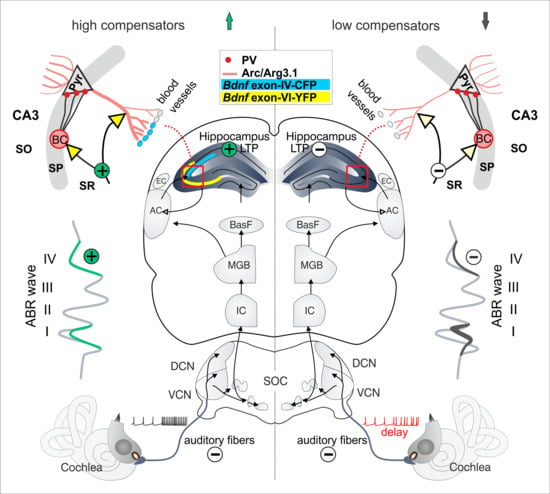Age-Dependent Auditory Processing Deficits after Cochlear Synaptopathy Depend on Auditory Nerve Latency and the Ability of the Brain to Recruit LTP/BDNF
Abstract
Share and Cite
Marchetta, P.; Savitska, D.; Kübler, A.; Asola, G.; Manthey, M.; Möhrle, D.; Schimmang, T.; Rüttiger, L.; Knipper, M.; Singer, W. Age-Dependent Auditory Processing Deficits after Cochlear Synaptopathy Depend on Auditory Nerve Latency and the Ability of the Brain to Recruit LTP/BDNF. Brain Sci. 2020, 10, 710. https://doi.org/10.3390/brainsci10100710
Marchetta P, Savitska D, Kübler A, Asola G, Manthey M, Möhrle D, Schimmang T, Rüttiger L, Knipper M, Singer W. Age-Dependent Auditory Processing Deficits after Cochlear Synaptopathy Depend on Auditory Nerve Latency and the Ability of the Brain to Recruit LTP/BDNF. Brain Sciences. 2020; 10(10):710. https://doi.org/10.3390/brainsci10100710
Chicago/Turabian StyleMarchetta, Philine, Daria Savitska, Angelika Kübler, Giulia Asola, Marie Manthey, Dorit Möhrle, Thomas Schimmang, Lukas Rüttiger, Marlies Knipper, and Wibke Singer. 2020. "Age-Dependent Auditory Processing Deficits after Cochlear Synaptopathy Depend on Auditory Nerve Latency and the Ability of the Brain to Recruit LTP/BDNF" Brain Sciences 10, no. 10: 710. https://doi.org/10.3390/brainsci10100710
APA StyleMarchetta, P., Savitska, D., Kübler, A., Asola, G., Manthey, M., Möhrle, D., Schimmang, T., Rüttiger, L., Knipper, M., & Singer, W. (2020). Age-Dependent Auditory Processing Deficits after Cochlear Synaptopathy Depend on Auditory Nerve Latency and the Ability of the Brain to Recruit LTP/BDNF. Brain Sciences, 10(10), 710. https://doi.org/10.3390/brainsci10100710





